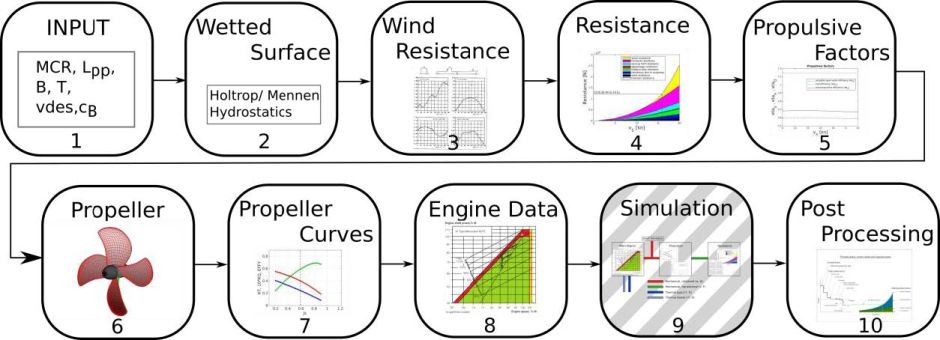Searching for energy efficiency with a new generic energy system model

Forecasts show a doubling of the world’s transportation needs until 2050. Shipping today accounts for 90% of all freight transport. Simultaneously, shipping must become cleaner and more energy-efficient to meet the target to more than halve 2005 greenhouse gas emissions by 2050. In his licentiate thesis, Fabian Tillig, Chalmers Mechanics and Maritime Sciences, presents a new generic and dynamic ship energy systems model.
Fabian Tilligs abstract:

To improve the energy efficiency of ships, we must be able to accurately predict and analyze the performance of ships not only in operation but also during the design of new ships as well as retrofitting of existing ships. Therefore, a practical and useful prediction method should not require prior measurements and should be applicable for an arbitrary ship.
The system “ship” is complex and composed by many components, which requires a structured- and component-based approach when analyzing and modelling this system. This thesis presents a generic ship energy systems model, which enables operational simulations and fuel consumption predictions of ships at sea with limited input parameters, i.e., without calibration or full-scale measurements. The simulation model consists of several empirical and semi-empiric methods to predict the performance of each component. To cover gaps where empirical methods were found unreliable, numerical standard propeller and hull series were developed.
Further on, the model was applied to two reference ships, one RoRo ship and one tanker, at four phases in the ship design process: (i) in the early phase, i.e., in the beginning of the ship design process when only the ship’s main dimensions are available; (ii) when the hull design is finished; (iii) when information from calm water model tests are available; and (iv) when the complete ship design is finished. A thorough uncertainty analysis was done for each component of the model to specify design and method uncertainties and to find the total uncertainty of the fuel consumption prediction.
In several case studies, the usability of the model was shown in, e.g., main dimension variations, sea margin variations and speed profile optimizations, for a given route with realistic weather and sea conditions. It is shown that a systems perspective is crucial to capture the interaction of different parts of the energy system “ship”.
The main conclusion of the work presented is that the developed generic energy systems model can predict the fuel consumption of an arbitrary ship at sea. Comparing fuel consumption prediction at design speed, it was found that the prediction with only the main dimensions available is within 5% of the prediction with model tests available. The comparison was done for the two reference ships and without calibration or prior measurements. The research is supervised by professor Jonas Ringsberg, Acting Deputy Head of Department and Head of Division of Marine Technology at the department of Mechanics and Maritime Sciences.
Related content:
-
 NextWave – en podd som ska locka unga
NextWave – en podd som ska locka unga -
 Ny studie: Eldrivna pendelbåtar kan effektivisera Stockholms kollektivtrafik
Ny studie: Eldrivna pendelbåtar kan effektivisera Stockholms kollektivtrafik -
 Sjöfartens utsläpp ökar
Sjöfartens utsläpp ökar -
 Sociala relationer påverkar val av bränsle
Sociala relationer påverkar val av bränsle -
 Sjöfartens omställning kräver ”mjukare” påtryckningar
Sjöfartens omställning kräver ”mjukare” påtryckningar -
 Hon hade avtalad tid med Kapten ynkrygg
Hon hade avtalad tid med Kapten ynkrygg -
 Lighthouse omvärldsanalys 2025 – osäkerhet och tullar präglar sjöfarten
Lighthouse omvärldsanalys 2025 – osäkerhet och tullar präglar sjöfarten -
 Se seminariet Shipping in the Marine Environment
Se seminariet Shipping in the Marine Environment -
 Vad betyder egentligen de 90 procenten?
Vad betyder egentligen de 90 procenten? -
 Hålla där...
Hålla där...

